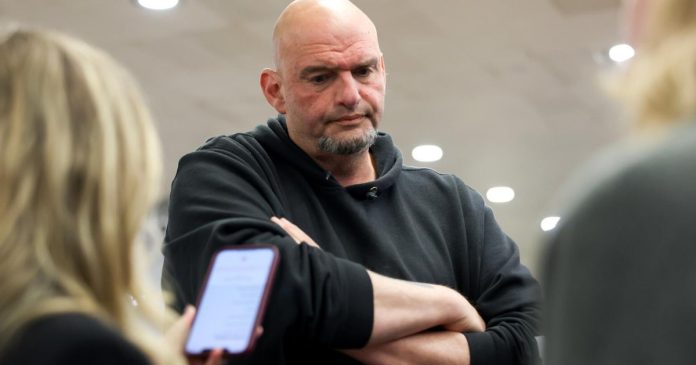The longest government shutdown in U.S. history might be coming to an end, in part after Pennsylvania Democratic Sen. John Fetterman helped to advance a stopgap funding bill Sunday night. However, some of his constituents said they struggled to reach his office ahead of the vote.
As word got around that a deal was imminent in the Senate to end the government shutdown, from his home near Harrisburg, Greg Loring-Albright decided to reach out to Fetterman. Like he’s done previously, he called the Capitol switchboard to route him to Fetterman’s office.
“It routed to a prerecorded message about how Senator Fetterman’s office was not taking calls because of the shutdown and because it was outside of business hours,” Loring-Albright said.
He thought he’d then get a beep to leave a voicemail, but he said instead the line disconnected after giving him the option to go to their website, something he didn’t want to spend the time doing.
“I couldn’t find a place to like, submit legislative comment,” Loring-Albright said about the website.
Having contacted multiple lawmakers in the past, Loring-Albright said even past normal hours, he’s been able to at least leave a voicemail.
“I just was hoping to encourage him to not follow the path that he seems intent on following, to just cave to the Republicans at every turn,” Loring-Albright said.
Loring-Albright wasn’t the only constituent to experience this. KDKA learned others also struggled to reach the senator, who voted to reopen the government multiple times before eventually doing so again Sunday night, joining seven other Democrats.
Fetterman talked to CBS Mornings afterwards in an interview set to air Tuesday morning.
“I strongly, strongly support those tax credits to make health care more affordable, but I just refuse to shut our government down and hold our government hostage,” Fetterman said.
As for Loring-Albright, he now plans to try to stop by the senator’s office in Harrisburg sometime this week, while making his voice heard online and on the streets.
“The rhetoric often is, you know, call your representatives, make your voice heard, and it’s like, I can’t do that,” Loring-Albright said. “I can only vote for a senator once every six years, and so for five years and 364 days, I should be able to leave a comment with my senator.”
KDKA-TV reached out to Fetterman’s office for comment. After the bill passes the Senate, the House is expected to consider it as early as Wednesday.








